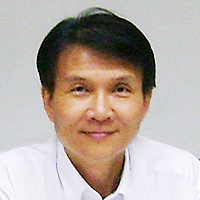Determination of the Effect of Zinc Acetate as a Doped Substance on the Properties of Cadmium Sulfide Nanomaterials by using a Hydrothermal Interaction Technique
Published on: 14th September, 2023
In the current work, cadmium sulfide nanoparticles (CdS) NPs were synthesized via the hydrothermal interaction technique. Especially, the deviation in zinc Acetate Zn(CH3CO2)2 with 0.5% 1.5%, and 2.25% was examined for its part in nanoparticles size. The nanoparticle size seems to reduce from 149.7 nm to 116.3 nm by enhancing the zinc acetate Zn(CH3CO2)2. With increasing zinc acetate Zn(CH3CO2)2 in CdS (Cadmium Sulfide) small lattice phase changes appeared due to angle peaks of diffraction shifting toward higher angle. The standard crystallite size and lattice parameters were analyzed through X-ray diffraction (XRD) characterization. The average crystallite size and volume unit cell were found to increment with increasing Zinc acetate Zn(CH3CO2)2 concentrations. Absorption peaks in the UV visible spectra corresponding to zinc acetate Zn(CH3CO2)2 of CdS (Cadmium Sulfide) were analyzed at various wavelengths of 368 nm and 369 and 371nm. These findings show the tuning ability of structural, and optical characteristics of cadmium sulfide (CdS) NPs.
Angioarchitectonics of acute pneumonia
Published on: 7th February, 2019
OCLC Number/Unique Identifier: 7997970981
The article presents the results of x-ray anatomical studies of 56 whole lung preparations, which were carried out immediately after the autopsy of children who died from АP. In 47 cases it was carried out the contrast of the vessels and in 9 cases the bronchial tree. The results allowed to clarify some details of the pathogenesis of АP and were additional arguments in support of the new doctrine of the disease.
Health care workers knowledge, attitude and practice towards hospital acquired infection prevention at Dessie referral hospital, Northeast Ethiopia
Published on: 5th December, 2019
OCLC Number/Unique Identifier: 8875584471
Introduction: Contact of health care workers and patient at health facility lead to the transmission of pathogenic organisms to each other. Hospital acquired infection prevention is standardized guide lines contain multitude protocols needed to be implemented by health care workers to reduce hospital acquired infections.
Objective: To assess health care workers knowledge, attitude and practice towards hospital acquired infection prevention at Dessie referral hospital.
Method: Institutional based cross sectional study was conducted among health care workers. The subjects were selected by proportional allocation in each respective department and simple random sampling method was employed. Statistical package for social sciences (SPSS) was used to analyze the data and presented in frequency tables and graph.
Results: 191 study subjects were participated in the study which gives a response rate of 90.5% from 211 total sample sizes. The study subjects had given their response according to self-administered questioner. The result indicates that 86.4%, 76.4% and 77% of respondents had good knowledge and favorable attitude and poor practice towards hospital acquired infection prevention respectively.
Conclusion: Even though the majority of the health care workers had good knowledge and favorable attitude, more than two third of them had poor practice towards hospital acquired infection prevention. Therefore health workers should strictly follow hospital acquired infection prevention guidelines. Improving sustainable supplies like personal protective equipment, water supply and hand washing facilities at patient care site is vital to correct the poor practice of infection prevention.
Acute and chronic changes in massive Barium Sulfate aspiration in an infant who subsequently was diagnosed with severe Gastro-esophageal Reflux
Published on: 19th June, 2017
OCLC Number/Unique Identifier: 7317654649
The barium is often used in radiocontrast examinations of the digestive system because of mucosal absorption is limited. Massive barium aspiration is a rare complication, especially when there is no anatomic or neurological deficit. The depending on barium concentration can cause various lung effects. When the literature is reviewed, barium aspiration may be asymptomatic or lethal in massive amounts. Rarely, large amounts of barium sulphate are aspirated into the lung, there is no literature study how often this is happening.
We present a case of massive barium aspiration in this subject. The case is related to a patient’s diagnostic esophagography who complaints swallowing problems. The massive barium aspiration couldn’t notice because of the absence of acute symptoms and surgical operation of gastrointestinal tract which the patient had undergone previously. When the patient applied our Pediatric Chest Diseases Polyclinic after three months, as a result of the examinations and deep research it was understood that the case was about massive barium aspiration. The patient was directed to our center because there was a radiological appearance of bone density signs on chest X-ray. Such a complaint was not reported by the family neighter in his biography, nor was written in the epicrisis. We will share acute and chronic changes in the lungs, diagnosis and treatment approaches of this case. The infant who has ileostomy was previously operated because of necrotizing enterocolitis. And also still has severe gastro-esophageal reflux and under conservative and medical treatment, a possible fundoplication surgery is planning.
Successful Therapy with intravenous gamma globulin in two children with postinfectious bronchiolitis obliterans
Published on: 23rd June, 2017
OCLC Number/Unique Identifier: 7317654734
Bronchiolitis obliterans (BO) is an infrequent clinical syndrome characterized by the chronic obstruction of small airways due to fibrosis [1]. Intravenous immunoglobulin (IVIG) could be used for treatment while underlying immune mechanisms in the pathogenesis of BO exist [2]. Here, we present two children with BO due to adenovirus infection whose complaints resolved after IVIG replacement.
Clinical Approach to Immunotherapy-induced Type 1 Diabetes Mellitus: A Case of Pembrolizumab Associated Insulin-dependent Diabetes in a Patient with NSCLC
Published on: 25th September, 2023
As the introduction of immune checkpoint inhibitors in the treatment of various cancers is now proven to be already acquired knowledge, so does a new challenge arise for clinicians; the understanding, diagnosis, and management of the rarest adverse effects of immunotherapy. We present a case of type-1 diabetes Mellitus (T1DM) in a patient with non-small cell lung carcinoma (NSCLC) treated with pembrolizumab. Following ten cycles of treatment, our patient was diagnosed with T1DM after being admitted for diabetic ketoacidosis and stayed hospitalized in the ICU. Later, they continued treatment with insulin, having shown disease response to pembrolizumab, and resumed immunotherapy while on insulin. Immunotherapy-induced T1DM can sometimes occur with PD1/PD-L1 blockage therapies. It has a rapid onset, is characterized by insulin deficiency due to the autoimmune destruction of beta-cells, and usually presents itself with diabetic ketoacidosis. Unlike most of the other adverse effects of immunotherapy, glucocorticoids don’t seem to be of therapeutic value, and insulin substitution is required. Regular glucose monitoring can be key to early diagnosis and prevention of hospitalization.
A Rare Case of Cutaneuos Angioleiomyoma: A Case Report
Published on: 17th October, 2024
Cutaneous Angioleiomyoma is a very rare benign tumour of which incidence is unknown. We report a case of a 42-year-old male patient who presented with a symptomless solitary nodule over the left nostril for one and a half years duration. Complete surgical excision of the tumour was done and the sample was sent for histopathological examination. Diagnosis of this tumour was done on the evidence of histopathological examination with haematoxylin and eosin mounts. Sometimes achieving the best aesthetically accepted results may be challenging due to the site of involvement.
Eosinophilic otitis media and eosinophilic asthma: Shared pathophysiology and response to anti-IL5
Published on: 4th June, 2019
OCLC Number/Unique Identifier: 8165317458
Asthma is a highly prevalent airway disease with multiple phenotypes [1,2]. Adult-onset eosinophilic asthma is a severe asthma subtype associated with more frequent and severe exacerbations, the development of persistent airflow limitation and a poorer quality of life. This type of asthma is much more difficult to control than other asthma subtypes, requiring high doses of inhaled or even oral corticosteroids (OCS) [3,4]. Recently, several new monoclonal antibody therapies have been approved for eosinophilic severe asthma, including anti-IL-5 treatment. IL-5 is essential for eosinophilic maturation and survival [5] and anti-IL5 treatment has markedly reduced asthma exacerbations with sparing of OCS use in patients with eosinophilic asthma [6]. Eosinophilic asthma is frequently associated with chronic rhinosinusitis and/or nasal polyposis [7], suggesting that a similar eosinophilic inflammatory process might drive both conditions. Eosinophilic otitis media (EOM) also might fit in this concept, showing remarkable similarities with asthma and nasal polyposis. The disease was first reported in 1994, but only since 2011 diagnostic criteria for EOM were identified. If a patient shows otitis media with effusion or chronic otitis media with eosinophil-dominant effusion (major criterion) and is being positive for ≥2 items of the 4 minor criteria (highly viscous middle ear effusion, resistance to conventional treatment, association with asthma, association with nasal polyposis) he is diagnosed as having EOM. Eosinophilic granulomatosis with polyangiitis and hypereosinophilic syndrome must be excluded [8].
Epidemiological Prevalence of Tuberculosis in the State of Maranhão between 2014 and 2016
Published on: 24th July, 2019
OCLC Number/Unique Identifier: 8207866924
Introduction: Tuberculosis is an infectious disease caused by Mycobacterium tuberculosis (Bacillus of Koch), and presents chronic evolution affecting the lungs frequently.
Objectives: Analyse, in the state of Maranhão, the epidemiological prevalence of tuberculosis between 2014 and 2016.
Materials and Methods: Documentary and descriptive study of secondary data collected in the database of the dates, epidemiological information and morbidities, between 2014 and 2016.
Results: 3,897 cases of tuberculosis in the state of Maranhão were recorded. The most affected age range was 15 to 59 years, totaling 3,111 cases, for both gender; of 60 to 79 years, 577 cases were totaled.
Conclusion: Tuberculosis affects more adolescent males from adolescence to old age, and it is necessary to promote knowledge of the disease for the population in order to advance in the control of the same and obtain satisfactory clinical results.
Capabilities Approaches Applied to the Homes of the Future
Published on: 30th July, 2025
The capabilities approach, based on the work of Sen and Nussbaum, proposes a transformation in housing design by prioritizing human well-being over economic criteria. This framework assesses individuals’ real opportunities to develop fulfilling lives (“capabilities”), responding to contemporary challenges such as climate change and urbanization. Recent studies indicate that 68% of architects integrate this approach into sustainable projects (Chen, et al. Journal of Sustainable Architecture, 2023, Q1), demonstrating its relevance for creating resilient and inclusive environments. The methodology combines theoretical analysis (UTAUT model for technology adoption and the capabilities approach) with global case studies. Designs are examined that incorporate: Smart technology: IoT and AI systems for security and energy efficiency; Biophilic design: Integrating nature into interior spaces; and Net-Zero Homes (NZEH): Energy self-sufficiency through renewables. Data were collected from projects in Belgium, Australia, and the US, assessing social and environmental impact using well-being and sustainability metrics. We determined the results and discussed the approach using Positive Impact: Smart-technology homes improve autonomy in older adults by 72% (Liu, et al. Gerontology, 2022, Q1). Projects such as Savonnerie Heymans (Brussels) reduced energy consumption by 40% through solar panels and thermal insulation, while increasing social cohesion with community spaces. Biophilic design: Associated with 30% less stress and 25% higher productivity; Barriers: High initial costs (up to 20% more than conventional housing) and regulatory complexity limit widespread adoption. Furthermore, feminist and decolonial critics warn that the approach can perpetuate inequalities if it ignores sociopolitical contexts. In conclusion, the capabilities approach revolutionizes future housing by merging human well-being, sustainability, and inclusion. However, its implementation requires overcoming economic and ethical challenges: Accessibility: Universal designs for vulnerable populations. Collaborative governance: Policies that balance innovation, data privacy, and affordability. Cultural adaptation: Integration of non-Western perspectives. Projections indicate that NZEHs will grow by 40% by 2030, highlighting their potential to build equitable and resilient societies.




